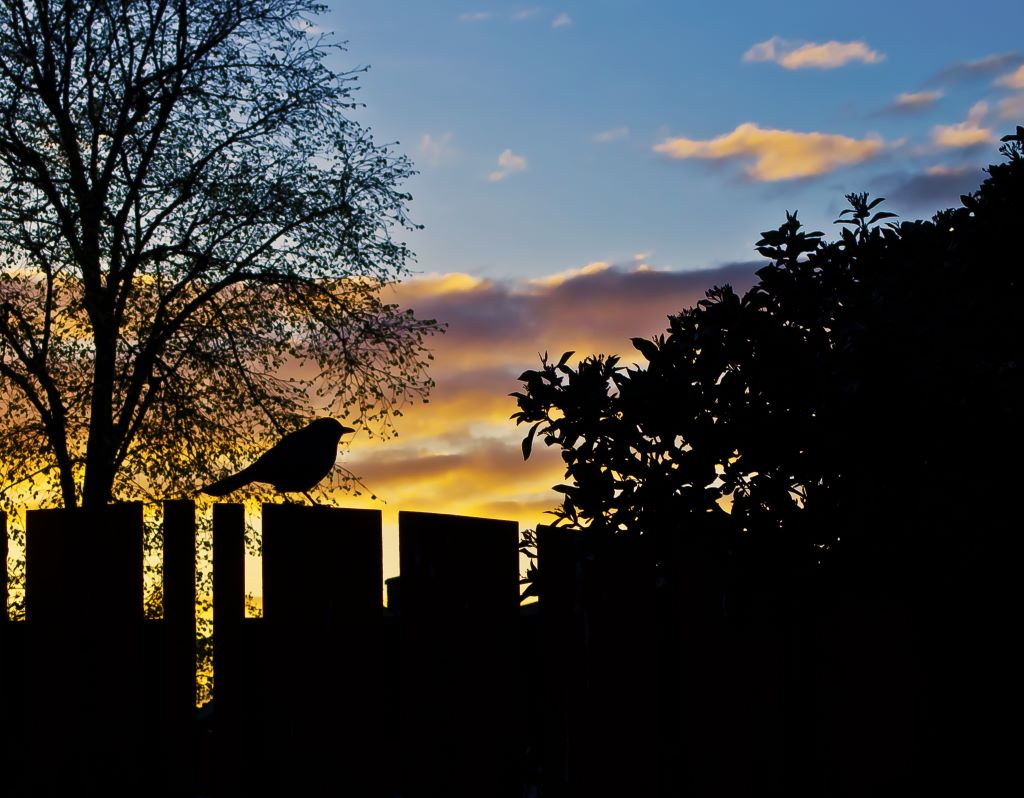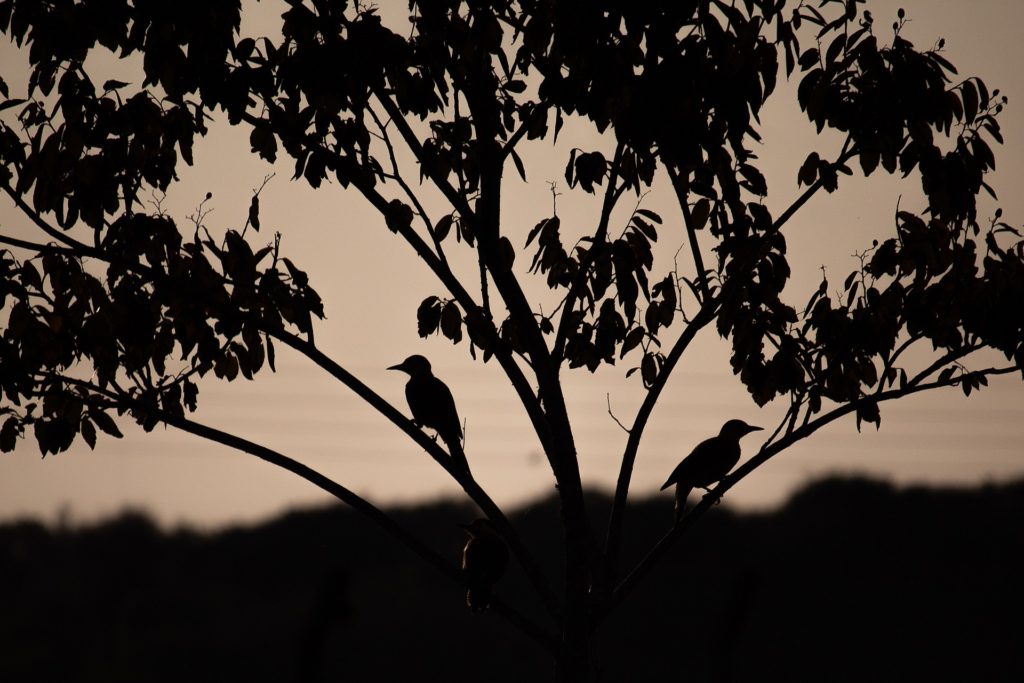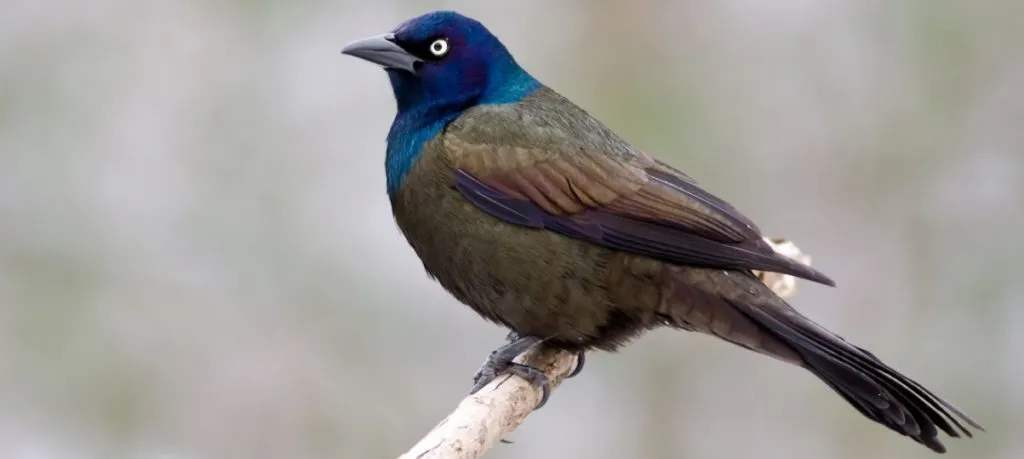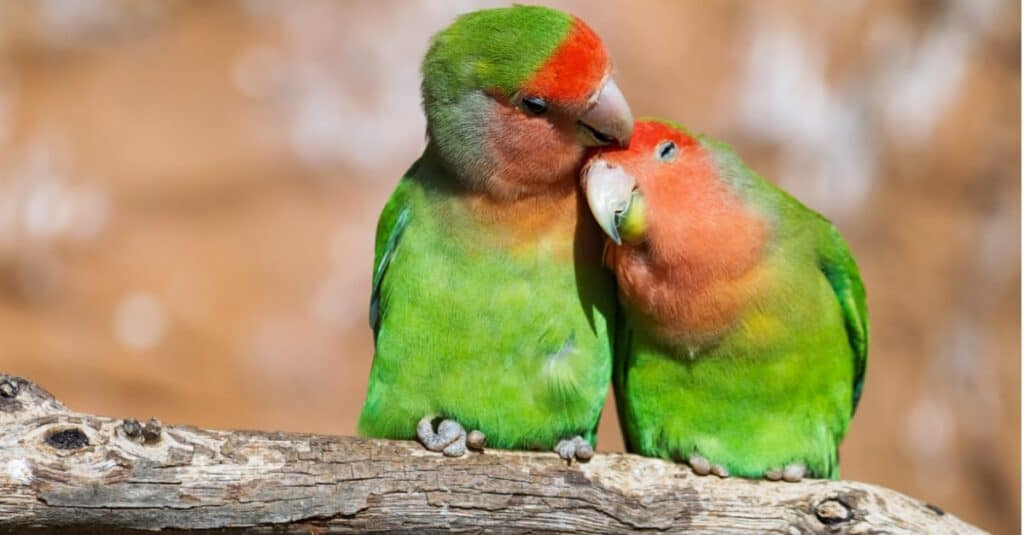Where Do Birds Go At Night? A Clear Overview

where do birds go at night
Who doesn’t love to watch birds? If you’ve ever caught sight of a majestic bald eagle floating through the air, you know how it can excite the soul, right?
In general, we can see birds everywhere throughout the day, foraging on the ground, flitting among trees, and perching on tree branches. But when the last rays of the sunlight disappear, all birds except some nocturnal birds like owls go somewhere.
So, where do birds go at night? Birds usually go to safe places to take rest and sleep at night. A perfect place for a songbird to sleep is out of sight, high up in the branches of trees or concealed by dense bushes. Besides, some small garden birds typically tend to sleep or roost in large flocks in bushes and trees, or they find a cavity in a tree to protect themselves from predators.
Do Birds Sleep at Night?
You might have a question peeping into your mind, “do birds sleep at night?”, then the answer is yes, most birds do.
Why can I hear birds singing at night?
If you’ve been hearing strange bird calls at night, and you’re pretty certain it’s not a nocturnal owl, it could be down this street lighting. It’s common for birds in urban and suburban areas to be woken from their slumber by artificial lighting. Birds like the robin, the song thrush, and the hedge sparrow are all known to sing well into the night when they are disturbed.
Robins are one of the first birds to start singing in the morning and are often one of the last to stop singing at night – they have even adapted to hunting for food when it’s dark. Sedge and reed warblers are also well known for singing a chorus or two during the night
But it’s a little bit complicated stuff to accomplish as birds follow numerous techniques when they need to get a little snooze.
Maximum birds are diurnal. It means birds are awake and active throughout the day and asleep at night. However, many nocturnal birds, also known as birds of prey, such as night-herons, owls, and nighthawks, don’t sleep at night.
You might also have seen some nocturnal birds flying at night. This is because they hunt at night and wake up until sunrise. During the day, these birds just hang around a safe place to get a little shut-eye.
How Do Birds Sleep?

where do the birds go at night
Birds’ principal nighttime activity is sleeping like other animals that are awake during day time. But, birds need to be careful in choosing their sleeping process to survive throughout the night. As they have some unique tactics that help warn and save them from predators.
Usually, most of the birds choose cavities to fry at night. In this way, they can prevent the hunter from normally having available to them.
Those cavities also protect them from cold weather. Additionally, tree canopies, dense thickets, and snags are other natural roosting spots for them.
Aside from this, wading birds like herons, flamingos, etc., sleep in water through the night. If any predator comes behind them before the water, the splashing sounds and wave vibrations give them an instant alarm of upcoming danger.
Besides, geese, ducks, and other waterfowls sleep floating on the surface of the water. They also follow the same alarm system, which wading birds pick advantage of.
Those birds also regularly float in the large flocks when they sleep, and this trick gives them the real benefit of amounts, in fact, predator access. Plus, small birds perch up in trees to sleep and are usually close to these trees’ trunks.
Diurnal vs Nocturnal Species
Most birds are diurnal. This means they are awake and most active through the day, but they usually sleep at night. Passerines, gulls, shorebirds, and most raptors are all diurnal birds.
On the other hand, nocturnal birds such as owls, nighthawks, frogmouths, and night-herons, are most active throughout the night. They forage, preen, hunt, care for their young, and do other necessary activities to survive in the darkest night hours.
Sometimes you can see diurnal birds that are relatively quiet and calm during nighttime hours to engage in other activities. They may be migrating or searching for mates at this time.
Where Do Birds Sleep at Night?

where do birds go at night in the winter
Birds are in a very vulnerable position to predators while they sleep. So, it’s essential to choose carefully where they spend the entire night.
Well, most of the birds, like small garden birds, are known to sleep perched high up in the trees or in cavities that are big enough. They may even flock together in a small place during a cold, windy night.
You can also provide the birds in your garden with a birdhouse, which will be a safe and comfy place for them. Also, don’t forget to provide them with some of their favorite foods like suet for birds!
Ducks, geese, and some other waterfowl are seen floating on the water to sleep, while wading birds, such as herons and flamingos, take a rest, standing in the water.
The most interesting thing is, that swifts and frigate birds spend almost their whole life in the air and sleep on the wing. Sounds unbelievable, right?
Plus, a 2016 survey showed that almost all the time half of their brain is asleep, though they go into a deeper REM sleep that doesn’t last more than a few seconds. You can call it a power nap.
Sleeping on Cold Nights
Very cold winter nights present extra challenges for birds at night. When temperatures drop, a sleeping bird could be subject to hypothermia, frostbite, and other dangerous conditions, but birds have adapted to sleep well even on the coldest nights.
Many bird species, most notably hummingbirds, can enter a state of torpor when they sleep. This lowers their body temperature, slows their metabolism, and conserves energy for them to survive colder temperatures at night.
Birds that gather in large roosts or join together in cavities or roost boxes can share body heat as they sleep. This can be risky, however, and birds may smother if they are grouped too closely in a small area with little ventilation.
Other Bird Nighttime Activities

where do all the birds go at night
While sleeping is the most popular nighttime activity for most birds, it is not the only thing birds will do at night. Depending on the time of year, birds may also work to attract mates or migrate to a new part of their range at night.
Night Singing: Birds that sing at night are advertising their territory at a time when there is less ambient noise and their calls can be heard at greater distances. This can help deter competitors as well as attract a mate. Many birds, such as the northern mockingbird, sedge warbler, and whip-poor-will have been known to sing nearly through the entire night. Nights with bright moonlight or in areas where there is a lot of artificial light are often filled with birdsong.
Night Migration: Many diurnal birds disrupt their activity patterns to migrate during the night instead of during the day. This allows them to take advantage of the same routes that birds of prey will use. Since raptors need daytime thermal currents to soar, migrating at night helps smaller birds avoid contact with too many airborne predators. Birds also use stars for navigating, and the less turbulent air at night can make flight easier and more efficient.
Do birds fly at night?
Nocturnal birds do of course fly at night but it’s not common for other birds to fly at night unless they are disturbed. If disturbed, you might see a bird flying to another safe spot to sleep, such as another tree or garden. However, there is such a thing as night migration for some birds. Sparrows and thrushes are known to fly at night when migrating south to avoid any dangerous predators.
WHERE DO CHICKADEES GO AT NIGHT?
Chickadees like to roost alone. Naturally, you find them in a hollow of a tree.
However, if you have a bird box or a roosting pocket available, they usually make good use of these.
WHERE DO PIGEONS GO AT NIGHT?

where do birds go at night time
Pigeons generally like a roofed area with a wide ledge to roost on.
That’s why you often find them on the beams and ledges of buildings.
WHERE DO SPARROWS GO AT NIGHT?
Sparrows are ones to disappear as night falls. You’ll find them tucked away in dense bush, shrubs, or even small cavities.
Out with breeding season sparrows a communal rooster, you’ll find many of them resting together.
WHERE DO STARLINGS GO AT NIGHT?
Starlings are to ultimate flock bird, so it’s no surprise that they will roost together.
What’s more, they are super adapted to roosting pretty much anywhere. They’ve adapted so well as an invasive species to the USA.
Final Words

where do birds go at night to sleep
Watching your feathered friends sticking around your backyard early in the morning and late in the afternoon, Of course, can instantly provide you much enjoyment. Their beautiful and colorful appearance can even make your cloudiest day brighter. That’s eye-soothing, isn’t it?
To be honest, where birds flourish, people succeed. Though the day may be a better time to find most birds, figuring out where birds sleep at nighttime can help bird lovers take essential steps and ensure the safety of most of the smallest birds every night.
There is a proverb that the birds of the day come back in the evening no matter what. Usually, the birds are very disciplined, and over time they become very conscious. By the way, do let us know how this.
Read More Article: Blackbirds In North Carolina 8 Types Of Blackbirds
Read More Article: Ugly Birds-Top 10 Ugliest Birds
Read More Article: Colorado Birds-Top 10 Colorado Birds And Facts
Read More Article: BIRDS IN TENNESSEE 17 Top17 Birds With Facts
Read More Article: Safflower Seed For Birds Feeders- Everything Explained
Read More Article: Can Dogs Eat Watermelon?






